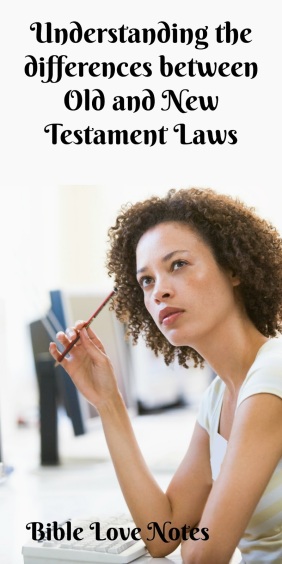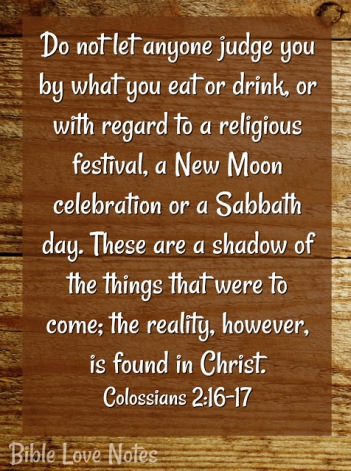
This devotion is important because there’s a growing number of groups claiming Christians must obey Old Testament dietary and ceremonial laws. This study will help you understand the purpose and validity of Old Testament laws so you can answer questions and avoid false teachings.
~ by Gail Burton Purath, (Shared from: Bite Size Bible Study )
The Old Testament contains sacrificial, dietary, ceremonial, civil, and permanent laws.
Christ fulfilled sacrificial laws that foreshadowed His death (Hebrews 10:1).
-Dietary laws ended when Jesus said, “What goes into someone’s mouth does not defile them, but what comes out of their mouth” (Matthew 15:11).
-Ceremonial laws reminded Israel of their spiritual history. We can observe feasts and festivals, but it’s not commanded. Christians have new reminders such as communion and baptism (Luke 22:19-20; Matthew 28:19).
-Civil laws governed Israel for a specific time in history. Christians glean principles from these laws but don’t obey them.
-Permanent, universal laws are confirmed in New Testament commands.
There are a number of groups today claiming that Christians must observe Old Testament ceremonial and dietary laws. This view contradicts Scripture.
Christ didn’t delete Old Testament laws, He fulfilled them (Matthew 5:17).(3) Following these laws does not make anyone a better Christian (Romans 14:4-6; Colossians 2:16-17). New Testament commands deal with moral choices, not food or holidays. We obey these commands because we love Jesus (John 14:21; Romans 8:1-17).
——————
For more on this: “Do Christians Have to Obey Old Testament Law?” and “How Christ Fulfilled the Old Testament” and “Does God Require Obedience to Dietary Laws?”
 (1) Acts 10:9-29confirmed this truth.This passage is more fully explained in the Bible study below.
(1) Acts 10:9-29confirmed this truth.This passage is more fully explained in the Bible study below.
(2) For example, the community was commanded to stone to death adult children who cursed their parents (Leviticus 20:9). There is a principle involved that still applies to us today (honoring parents-Ephesians 6:2), but the punishment was specific to that point in Israel’s history. We shouldn’t be surprised that not every command is applicable to us today. This happens in the New Testament as well. For example, Christ gave the seventy-twomissionaries specific instructions when He sent them out. Their instructions are in the Word of God, but they are not permanent laws for all missionaries or evangelists (Luke 10:1-17).
(3) Note the context of this statement (Matthew 5:17-48). Christ follows these words by explaining that sin flows from the heart. It’s not just about external actions but about thoughts and motives. Christ does not mention sacrificial, dietary, or ceremonial laws in this passage.
See more on this subject: Which Old Testament Laws Apply Today?
Bible Study
A growing number of groups teach observance of Old Testament dietary and ceremonial laws. (See Upside-Down Truth.) These groups are part of the “Hebrew Roots Movement.” Some in the movement claim the New Testament was corrupted and that is why their teaching contradicts many passages of Scripture. Others in the movement use complicated Scriptural explanations, denying the clear intent of multiple Bible passages. To accept their teaching, one must believe that God wasn’t capable of maintaining the integrity of Scripture throughout most of New Testament history. And one must believe that millions of Bible scholars, missionaries, martyrs, pastors, teachers and lay people were deceived. In reality, God has gone to great extents to maintain and prove Scripture’s validity. See Living Dead Sea Scrolls. Whether you encounter someone from the Hebrews Roots movement or simply want to answer questions about Old Testament laws, it’s important to understand what the Bible teaches.
1. Regarding Sacrificial Laws:
 Hebrews 10:8-14: Christ said, “You did not want animal sacrifices or sin offerings or burnt offerings or other offerings for sin, nor were you pleased with them” (though they are required by the law of Moses). 9 Then he said, “Look, I have come to do your will.” He cancels the first covenant in order to put the second into effect. 10 For God’s will was for us to be made holy by the sacrifice of the body of Jesus Christ, once for all time. 11 Under the old covenant, the priest stands and ministers before the altar day after day, offering the same sacrifices again and again, which can never take away sins. 12But our High Priest offered himself to God as a single sacrifice for sins, good for all time. Then he sat down in the place of honor at God’s right hand. 13 There he waits until his enemies are humbled and made a footstool under his feet. 14 For by that one offering he forever made perfect those who are being made holy.
Hebrews 10:8-14: Christ said, “You did not want animal sacrifices or sin offerings or burnt offerings or other offerings for sin, nor were you pleased with them” (though they are required by the law of Moses). 9 Then he said, “Look, I have come to do your will.” He cancels the first covenant in order to put the second into effect. 10 For God’s will was for us to be made holy by the sacrifice of the body of Jesus Christ, once for all time. 11 Under the old covenant, the priest stands and ministers before the altar day after day, offering the same sacrifices again and again, which can never take away sins. 12But our High Priest offered himself to God as a single sacrifice for sins, good for all time. Then he sat down in the place of honor at God’s right hand. 13 There he waits until his enemies are humbled and made a footstool under his feet. 14 For by that one offering he forever made perfect those who are being made holy.
Jesus did not abolish the sacrificial laws, He fulfilled them.
2. Regarding Ceremonial and Dietary Laws:
These laws would include any of the Old Testament laws that made a person unclean because of something they touched or for a body function. For example, Leviticus 15:19. This was a huge issue in the early church where Jews and Gentiles mingled. It was hard for Jews to give up laws that so long had been a sign of their faithfulness to the Old Covenant. Peter flip-flopped on this issue himself and Paul rebuked him. (Galatians 2:11-21).
Note this verse from the Galatians text: “Since you, a Jew by birth, have discarded the Jewish laws and are living like a Gentile, why are you now trying to make these Gentiles follow the Jewish traditions?” Paul was not saying Peter lived immorally like unbelieving Gentiles. He was saying that Peter no longer obeyed Jewish dietary and ceremonial laws. No other meaning makes sense. For the sake of space, I will not include the full text of Acts 10:9-29, but please read it and note the emphasis God gives to calling unclean foods clean.
Some in the Hebrew Roots movement claim that Acts 10 has nothing to do with clean and unclean foods. However, God three times showed Peter unclean foods and three times told him to eat those foods and quit calling them unclean. It’s interesting to note how something given from God three times has special emphasis (Genesis 41:32;John 21:17). God wanted Peter to go to Cornelius’ Gentile home, so He started by showing Peter that no food was unclean under the New Covenant. Therefore, no person was unclean because of what he/she ate. But God went further than telling Peter not to judge Gentiles by the food they ate. He told Peter he could eat those foods as well and told Peter not to call them unclean.
I believe there are sincere believers involved in the Hebrews Roots movement, but they are sincerely wrong about the need for Christians to obey Old Testament dietary and ceremonial laws. Paul clearly states the truth so that no one can claim the Old Testament dietary and ceremonial laws apply to New Testament Christians:
 Romans 14:14a: I am convinced, being fully persuaded in the Lord Jesus, that nothing is unclean in itself. Paul allows for the fact that some will continue to follow the Old Testament laws. If it violates a person’s conscience to eat certain foods, as it did the early Jewish believers, then they should follow their conscience.
Romans 14:14a: I am convinced, being fully persuaded in the Lord Jesus, that nothing is unclean in itself. Paul allows for the fact that some will continue to follow the Old Testament laws. If it violates a person’s conscience to eat certain foods, as it did the early Jewish believers, then they should follow their conscience.
Romans 14:14b: But if anyone regards something as unclean, then for that person it is unclean. On at least one occasion, Paul chose to follow an unnecessary law in order to minister to Jews and not offend them (Acts 21:24). Scripture clearly forbids one Christian from judging another Christian according to diet and holy-day observances.
Romans 14:6: Those who worship the Lord on a special day do it to honor him. Those who eat any kind of food do so to honor the Lord, since they give thanks to God before eating. And those who refuse to eat certain foods also want to please the Lord and give thanks to God. The Hebrews Roots teaches that Romans 14 is about vegetarianism but the word “meat” used in the NIV, is not found in the original Greek nor is there anything in this passage that implies only meat is involved in this command.
Colossians 2:16-17: Therefore do not let anyone judge you by what you eat or drink, or with regard to a religious festival, a New Moon celebration or a Sabbath day. 17 These are a shadow of the things that were to come; the reality, however, is found in Christ.
Regarding the Old Testament Observance of Saturday Sabbath. See “The 9 Commandments“
3. We allow for differences among Christians but we don’t judge those who disagree and we don’t claim our view is commanded by God:
Romans 14:3-5, 13: Those who feel free to eat anything must not look down on those who don’t. And those who don’t eat certain foods must not condemn those who do, for God has accepted them. 4 Who are you to condemn someone else’s servants? Their own master will judge whether they stand or fall. And with the Lord’s help, they will stand and receive his approval. 5 In the same way, some think one day is more holy than another day, while others think every day is alike. You should each be fully convinced that whichever day you choose is acceptable… Yes, each of us will give a personal account to God… 13 So let’s stop condemning each other. Decide instead to live in such a way that you will not cause another believer to stumble and fall.
The problem with the Hebrew Roots movement is not that they choose to obey Old Testament dietary and ceremonial laws. The problem is that they distort Scripture’s clear intent and teach that keeping these laws is required of all Christians. I pray for those sincere Christians caught in this movement, that they will know the truth and the truth will set them free (John 8:32).

Although this is a very good article, please allow me to explain some things for you.
As a natural path for about forty years I can attest to the fact that those follow the dietary laws there is a lot less sickness in their lives, they are more energetic and mentally stronger. This is from my personal testimony and from experience with others.
The Old Testament lays the foundation for the New Testament. When you understand the Old Testament then you will understand more in the New.
Many of the teachings in the New Testament come from the Old and many times Jesus and the disciples quoted from the Old.
Both are equally important.
LikeLike
Thanks for the explanation. I am not confused in anyway. I’m not sure if you read the entire post.
There is nothing in the article that is AGAINST God’s Word, the Law or the Old Testament. Maybe you do not understand that true Christians do read and love the Word of God in it’s entirety.
The Law is GOOD because it is God’s Law. Christians hold to the truth that the Cross of Christ ALONE has set us free from the penalty of the Law.
~1 Corinthians 15:56, “The sting of death is sin, and the power of sin is the Law.”~
I’m not against eating well or taking into account those things in the Law that make me stronger and better… physically or spiritually. I just do not hold on to the Law for my salvation… my salvation is utterly and totally wrapped up in my faith in the work that Jesus did for me and the Love that He demonstrated for me on the Cross. Why would I try to embellish on what God has done… that admittedly I can’t do for myself?
It is Finished.
LikeLike
Understanding the Law and the work of the Cross:
-John Gil’s Commentary 1 Corinthians 15:56:
<The sting of death is sin…
Death has a sting, which was originally in it, and that is sin; sin is the cause of death, it is what has given rise and being to it; it entered into the world by it, and is supported in its empire through it; it gives it its resistless power, which reaches to all sorts of persons, young and old, rich and poor, high and low, bond and free; it gives it all its bitterness, agonies, and miseries; and it is by that it does all the hurt and mischief it does; and it may fitly be compared to a sting, for its poisonous and venomous nature:
<and the strength of sin is the law…
Not that the law of God is sinful, or encourages sin: it forbids it under the severest penalty; but was there no law there would be no sin, nor imputation of it; sin is a transgression of the law: moreover, the strength of sin, its evil nature, and all the dreadful aggravations of it, and sad consequences upon it, are discovered and made known by the law; and also the strength of it is drawn out by it, through the corruption of human nature; which is irritated and provoked the more to sin, through the law's prohibition of it; and this is not the fault of the law, but is owing to the vitiosity (defect) of nature; which the more a thing is forbidden, the more desirous it is of it; to which may be added, that sin is the more exceeding sinful, being committed against a known law, and that of the great lawgiver, who is able to save and to destroy; whose legislative power and authority are slighted and trampled upon by it, which makes the transgression the more heinous; it is the law which binds sin upon a man's conscience, accuses him of it, pronounces him guilty, curses, condemns, and adjudges him to death for it.
LikeLike